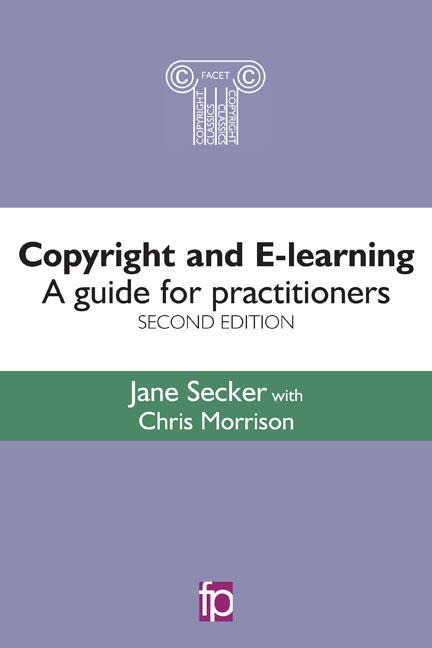Book contents
- Frontmatter
- Contents
- Figures, tables and case studies
- Preface to the second edition
- Introduction
- Abbreviations and acronyms
- Glossary
- 1 E-learning and copyright: background
- 2 Digitizing text-based content for delivery in a VLE
- 3 Using digital media: video, images, sound and software
- 4 Copyright issues and born digital resources
- 5 Copyright in the connected digital environment
- 6 Copyright education and training
- 7 Conclusion
- Further resources
- Index
Preface to the second edition
Published online by Cambridge University Press: 08 June 2018
- Frontmatter
- Contents
- Figures, tables and case studies
- Preface to the second edition
- Introduction
- Abbreviations and acronyms
- Glossary
- 1 E-learning and copyright: background
- 2 Digitizing text-based content for delivery in a VLE
- 3 Using digital media: video, images, sound and software
- 4 Copyright issues and born digital resources
- 5 Copyright in the connected digital environment
- 6 Copyright education and training
- 7 Conclusion
- Further resources
- Index
Summary
In a recent conference workshop I asked staff working in higher education to choose from a list of adjectives that might describe copyright and new technologies such as social media, and to consider any words that might apply to both. The exercise revealed that a perception remains that many of those in education regard copyright laws as restrictive, slow to evolve and somewhat out of step with the digital age, while technology is seen as exciting, constantly evolving, and responsive to the user. This perception was one that I had been keen to counteract when first writing this book in 2009. However, the exercise also highlighted that the intersection between copyright laws and new technologies remains an area of considerable interest, but one of much concern to people. During the workshop the group discussed how the two concepts had more in common than it might appear, yet the grey areas, the areas particularly where the law is open to interpretation, worry people. What emerged from the workshop for me was the need to challenge the notion that technology and copyright exist outside the control of society. We need to remind educators that copyright laws and new technologies are intended to serve society, not just to provide financial rewards to the creative industries but also to allow new research and education to flourish. We also need to be mindful that technology is not neutral but a construct of the society we live in and shaped by all sorts of factors, including commercial interests. The quote (often incorrectly attributed to the Canadian philosopher of communication theory, Marshall McLuhan)1 that ‘we shape our tools and then they shape us’ illustrates how both technologies and copyright laws are determined by societal norms. Therefore, if there is a belief amongst educators that either of these are working against society and hindering the free flow of information in the education system, then this needs to be addressed. There are already far too many misunderstandings about copyright, and while it is overly simplistic to view it as a simple set of rules, this book attempts to distil good practice based on practical experiences and equip practitioners with a framework to tackle queries that arise in their day to day work.
- Type
- Chapter
- Information
- Copyright and E-learninga guide for practitioners, pp. xi - xivPublisher: FacetPrint publication year: 2016



